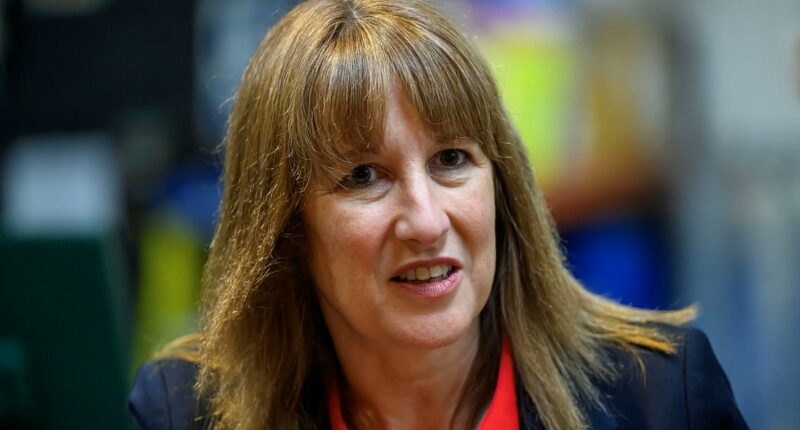Share this @internewscast.com
There’s perhaps a sense of relief in the air.
Although Britain’s gross debt is projected to climb to a peak of 105.5% of the national output by 2028, the International Monetary Fund (IMF) remains unconcerned.
Mark Carney, a former governor of the Bank of England, once remarked that the UK’s stability relies on the ‘kindness of strangers.’
However, Vitor Gaspar, the IMF’s head of fiscal affairs, is confident that the liquidity and diversification in the British bond markets will allow for resilience. One wonders if he’s overlooked the era of Liz Truss.
There is a noticeable difference in opinion between the IMF and the Chancellor regarding the regularity of fiscal updates.
IMF analysts suggest that Rachel Reeves may have complicated matters with her decision to present a Budget in the autumn followed by an adjustment in the spring.

Pressure: IMF experts believe that Rachel Reeves has made a rod for her own back with a Budget in the Autumn and a mid-course correction in the spring
In the interest of clarity (one might add sanity and certainty) the Government should confine itself to one event a year.
This should not constrain the Office for Budget Responsibility from producing its twice-a-year projections.
Far from delivering the certainty as intended, the rigidity of Rachel Reeves’ fiscal rules has created its own problem.
By leaving such a small amount of headroom – something which might change in the November 26 Budget – the Chancellor has created a climate of continuous and dangerous speculation about tax changes.
Fears of limits on the size of tax-free lump sums that can be withdrawn from pensions have caused capital to flee.
Tax-free cash ISAs are back in the firing line. There is a mistaken belief that the freed-up cash will head towards UK stocks. A better way of doing that would be to axe stamp duty on share deals.
Reeves’ commitment to iron rules, intended as a riposte to Tory profligacy, is political. Even the IMF supports adapting the rules to current conditions. The Chancellor is trapped by inflexibility.
Rate split
The US and Britain often move in the same direction on interest rates.
The Federal Reserve has more latitude than the Bank of England because it is mandated by Congress to consider employment when making decisions.
Under-pressure Fed chairman Jay Powell has indicated that low hiring in September could pave the way for a cut in the rate, from the 4.25 per cent to 4.50 per cent range, when it next meets on October 28-29.
Bank of England Governor Andrew Bailey is in a more difficult position. The jobs market in the UK has deteriorated sharply since last year’s Budget.
Unemployment jumped to 4.8 per cent, vacancies are dropping and payroll numbers, regarded as a reliable measure, fell by 10,000 over the last three months.
The Bank could get behind growth by cutting rates from 4 per cent at its November session. Indeed, Bailey indicated, in remarks to bankers at the Institute of International Finance in Washington, that this would be a preference.
The difficulty is that UK inflation is forecast by the IMF to come in at 3.4 per cent this year and could be as high as 2.5 per cent in 2026, far above the Treasury’s 2 per cent target.
IMF economists suggest a cut at November’s session of the Monetary Policy Committee would be unwise, despite the fact that average wage increases are trending down.
Bailey won’t want to be on the wrong side of history by keeping rates too high for too long. The Bank held them low for too long after the inflation genie escaped following Covid.
British consumer prices are out of kilter with the rest of the G7. As a consequence the Bank’s divided interest rate-setting committee can be expected to leave rates unchanged at its next meeting.
That won’t help housing, business investment or growth.
A bout of the British disease of stagnating output is very real.
Scan scam
Nothing is more annoying than restaurants and bars which, long after the pandemic, insist customers access menus using QR codes.
The disease has reached the hallowed halls of the World Bank.
Delegates and media wanting to access events, transcripts, seminars or maybe even catch a glimpse of elusive president Ajay Banga are requested to download a QR codeIsn’t progress wonderful?
DIY INVESTING PLATFORMS
AJ Bell

AJ Bell
Easy investing and ready-made portfolios
Hargreaves Lansdown

Hargreaves Lansdown
Free fund dealing and investment ideas
interactive investor

interactive investor
Flat-fee investing from £4.99 per month
InvestEngine

InvestEngine
Account and trading fee-free ETF investing
Trading 212
Trading 212
Free share dealing and no account fee
Affiliate links: If you take out a product This is Money may earn a commission. These deals are chosen by our editorial team, as we think they are worth highlighting. This does not affect our editorial independence.
Compare the best investing account for you










